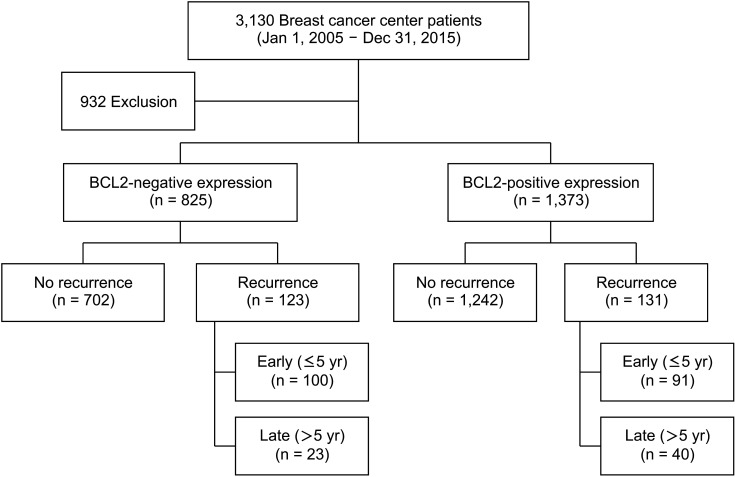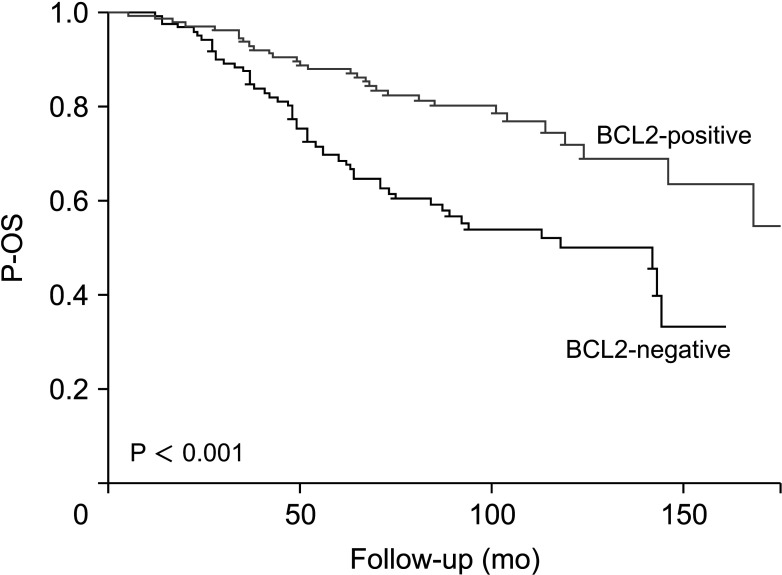Ann Surg Treat Res.
2023 Jul;105(1):20-30. 10.4174/astr.2023.105.1.20.
Prognostic influences of B-cell lymphoma 2–positive expression on late recurrence in breast cancer
- Affiliations
-
- 1Division of Breast Surgery, Department of Surgery, Eunpyeong St. Mary’s Hospital, College of Medicine, The Catholic University, Seoul, Korea
- KMID: 2544609
- DOI: http://doi.org/10.4174/astr.2023.105.1.20
Abstract
- Purpose
B-cell lymphoma 2 (BCL2) has an antiapoptotic role, however, has resulted in it being a powerful favorable prognostic factor in breast cancer. Several studies revealed BCL2 is strongly associated with a lower rate of early recurrence after initial treatment in breast cancer patients, but study of a prolonged effect after 5 years is lacking. We investigated BCL2 as a prognostic factor in breast cancer in comparison to early and late recurrence.
Methods
We retrieved data from 2,198 patients with primary breast cancer who underwent surgical treatment and adjuvant treatment at the breast cancer center between 2005 and 2015. Each molecular subtype was classified, and Ki-67 and BCL2 were also assessed by immunohistochemistry. BCL2 and the association between molecular subtypes were assessed in early and late recurrences, respectively. Five-year postrecurrence survival and BCL2 were also assessed.
Results
The BCL2-positive group was associated with favorable clinicopathologic characteristics. The time to recurrence was significantly longer in the BCL2-positive group (P = 0.035). Late recurrence after 5 years was higher in the BCL2-positive group (P = 0.029). In multivariate survival analysis, tumor size and BCL2-positive expression were the only independent prognostic factors for late recurrence (P = 0.004). In the patients with recurrence, 5-year postrecurrence survival was significantly higher in the BCL2-positive group (P < 0.001).
Conclusion
Our result showed that prognosis was better in BCL2-positive patients compared to BCL2-negative patients at late recurrence. We suggested that BCL2 expression could be used as a marker to help determine additional adjuvant therapy or extended hormone therapy in hormone-dependent breast cancer.
Keyword
Figure
Reference
-
1. Fumagalli C, Barberis M. Breast cancer heterogeneity. Diagnostics (Basel). 2021; 11:1555. PMID: 34573897.2. Fane M, Weeraratna AT. How the ageing microenvironment influences tumour progression. Nat Rev Cancer. 2020; 20:89–106. PMID: 31836838.3. Leone JP, Vallejo CT, Hassett MJ, Leone J, Graham N, Tayob N, et al. Factors associated with late risks of breast cancer-specific mortality in the SEER registry. Breast Cancer Res Treat. 2021; 189:203–212. PMID: 33893907.4. Murata T, Jinno H, Takahashi M, Shimoda M, Hayashida T, Kameyama K, et al. Clinicopathologic features of hormone-receptor-positive breast cancer patients with late recurrence. Breast J. 2019; 25:9–15. PMID: 29687661.5. Colleoni M, Sun Z, Price KN, Karlsson P, Forbes JF, Thürlimann B, et al. Annual hazard rates of recurrence for breast cancer during 24 years of follow-up: results from the International Breast Cancer Study Group trials I to V. J Clin Oncol. 2016; 34:927–935. PMID: 26786933.6. Sestak I, Cuzick J. Markers for the identification of late breast cancer recurrence. Breast Cancer Res. 2015; 17:10. PMID: 25848913.7. Esserman LJ, Moore DH, Tsing PJ, Chu PW, Yau C, Ozanne E, et al. Biologic markers determine both the risk and the timing of recurrence in breast cancer. Breast Cancer Res Treat. 2011; 129:607–616. PMID: 21597921.8. Zhang Y, Schnabel CA, Schroeder BE, Jerevall PL, Jankowitz RC, Fornander T, et al. Breast cancer index identifies early-stage estrogen receptor-positive breast cancer patients at risk for early- and late-distant recurrence. Clin Cancer Res. 2013; 19:4196–4205. PMID: 23757354.9. Sgroi DC, Sestak I, Cuzick J, Zhang Y, Schnabel CA, Schroeder B, et al. Prediction of late distant recurrence in patients with oestrogen-receptor-positive breast cancer: a prospective comparison of the breast-cancer index (BCI) assay, 21-gene recurrence score, and IHC4 in the TransATAC study population. Lancet Oncol. 2013; 14:1067–1076. PMID: 24035531.10. Lee YJ, Jung SP, Bae JW, Yang SM, You JY, Bae SY. Prognosis according to the timing of recurrence in breast cancer. Ann Surg Treat Res. 2023; 104:1–9. PMID: 36685773.11. Foldi J, O'Meara T, Marczyk M, Sanft T, Silber A, Pusztai L. defining risk of late recurrence in early-stage estrogen receptor-positive breast cancer: clinical versus molecular tools. J Clin Oncol. 2019; 37:1365–1369. PMID: 30943126.12. Hwang KT, Kim YA, Kim J, Oh HJ, Park JH, Choi IS, et al. Prognostic influences of BCL1 and BCL2 expression on disease-free survival in breast cancer. Sci Rep. 2021; 11:11942. PMID: 34099764.13. Dawson SJ, Makretsov N, Blows FM, Driver KE, Provenzano E, Le Quesne J, et al. BCL2 in breast cancer: a favourable prognostic marker across molecular subtypes and independent of adjuvant therapy received. Br J Cancer. 2010; 103:668–675. PMID: 20664598.14. Goldhirsch A, Winer EP, Coates AS, Gelber RD, Piccart-Gebhart M, Thürlimann B, et al. Personalizing the treatment of women with early breast cancer: highlights of the St Gallen International Expert Consensus on the Primary Therapy of Early Breast Cancer 2013. Ann Oncol. 2013; 24:2206–2223. PMID: 23917950.15. Cory S, Huang DC, Adams JM. The Bcl-2 family: roles in cell survival and oncogenesis. Oncogene. 2003; 22:8590–8607. PMID: 14634621.16. Vogler M. Targeting BCL2-proteins for the treatment of solid tumours. Adv Med. 2014; 2014:943648. PMID: 26556430.17. Neri A, Marrelli D, Roviello F, DeMarco G, Mariani F, DeStefano A, et al. Bcl-2 expression correlates with lymphovascular invasion and long-term prognosis in breast cancer. Breast Cancer Res Treat. 2006; 99:77–83. PMID: 16541314.18. Martin LA, Dowsett M. BCL-2: a new therapeutic target in estrogen receptor-positive breast cancer? Cancer Cell. 2013; 24:7–9. PMID: 23845438.19. Park SH, Kim H, Song BJ. Down regulation of bcl2 expression in invasive ductal carcinomas is both estrogen- and progesterone-receptor dependent and associated with poor prognostic factors. Pathol Oncol Res. 2002; 8:26–30. PMID: 11994759.20. Teixeira C, Reed JC, Pratt MA. Estrogen promotes chemotherapeut ic drug resistance by a mechanism involving Bcl-2 proto-oncogene expression in human breast cancer cells. Cancer Res. 1995; 55:3902–3907. PMID: 7641210.21. Honma N, Horii R, Ito Y, Saji S, Younes M, Iwase T, et al. Differences in clinical importance of Bcl-2 in breast cancer according to hormone receptors status or adjuvant endocrine therapy. BMC Cancer. 2015; 15:698. PMID: 26472348.22. Callagy GM, Webber MJ, Pharoah PD, Caldas C. Meta-analysis confirms BCL2 is an independent prognostic marker in breast cancer. BMC Cancer. 2008; 8:153. PMID: 18510726.23. Yang D, Chen MB, Wang LQ, Yang L, Liu CY, Lu PH. Bcl-2 expression predicts sensitivity to chemotherapy in breast cancer: a systematic review and meta-analysis. J Exp Clin Cancer Res. 2013; 32:105. PMID: 24370277.24. Silvestrini R, Veneroni S, Daidone MG, Benini E, Boracchi P, Mezzetti M, et al. The Bcl-2 protein: a prognostic indicator strongly related to p53 protein in lymph node-negative breast cancer patients. J Natl Cancer Inst. 1994; 86:499–504. PMID: 8133533.25. van Slooten HJ, Clahsen PC, van Dierendonck JH, Duval C, Pallud C, Mandard AM, et al. Expression of Bcl-2 in node-negative breast cancer is associated with various prognostic factors, but does not predict response to one course of perioperative chemotherapy. Br J Cancer. 1996; 74:78–85. PMID: 8679463.26. Callagy GM, Pharoah PD, Pinder SE, Hsu FD, Nielsen TO, Ragaz J, et al. Bcl-2 is a prognostic marker in breast cancer independently of the Not tingham Prognostic Index. Clin Cancer Res. 2006; 12:2468–2475. PMID: 16638854.27. Hwang KT, Woo JW, Shin HC, Kim HS, Ahn SK, Moon HG, et al. Prognostic influence of BCL2 expression in breast cancer. Int J Cancer. 2012; 131:E1109–E1119. PMID: 22418857.28. Dowling RJ, Kalinsky K, Hayes DF, Bidard FC, Cescon DW, Chandarlapaty S, et al. Toronto workshop on late recurrence in estrogen receptor-positive breast cancer: part 1. Late recurrence: current understanding, clinical considerations. JNCI Cancer Spectr. 2019; 3:pkz050. PMID: 32337479.29. Wangchinda P, Ithimakin S. Factors that predict recurrence later than 5 years after initial treatment in operable breast cancer. World J Surg Oncol. 2016; 14:223. PMID: 27557635.30. Pedersen RN, Esen BÖ, Mellemkjær L, Christiansen P, Ejlertsen B, Lash TL, et al. The incidence of breast cancer recurrence 10-32 years after primary diagnosis. J Natl Cancer Inst. 2022; 114:391–399. PMID: 34747484.
- Full Text Links
- Actions
-
Cited
- CITED
-
- Close
- Share
- Similar articles
-
- Characteristics of Late Recurrent Breast Cancers More than 5 Years after Primary Treatment
- Prognosis according to the timing of recurrence in breast cancer
- BCL2 as a Subtype-Specific Prognostic Marker for Breast Cancer
- Expression Pattern of Glucose Transporter GLUT1 Protein & Its Correlation with Prognostic Factors in Breast Cancer
- Expression Pattern of Glucose Transporter GLUT1 Protein & Its Correlation with Prognostic Factors in Breast Cancer



